An Analysis of the First Presidential Debate
by Zadok Lin
語言:
English
Photo Credit: Public Television
Introduction
THE TWO AND a half hours of the first presidential candidate debate took place on December 27th. The debate was structured into three separate rounds; Round 1 was the preface and overview of the candidates’ policies and what they had to say to the audience, Round 2 consisted of Q&A from five different media outlets, and Round 3 allowed for each candidate to inquire one another about statements.
With respect to commentary on the presidential debate, this article aims to serve three purposes: the first is to analyze the nuances and strategies adopted by each candidate. The second is to show how the entire debate was largely empty talk and bad rhetoric, and finally, to provide an analysis to the public response and reaction received after the debate.
Given that polling shows Eric Chu and James Soong lag far behind Tsai Ing-wen, good faith and a miracle would be needed to assume the debate would turn the tables at all. A presidential debate is usually assumed to be the opportunity for candidates to boost their popularity and credibility through charisma and not through what they have to offer with their policies. Therefore, this debate is meant to be a war of words, of who gets to influence public discourse. Possibly, the debate might serve as a platform for some individuals to reconstruct their public image.
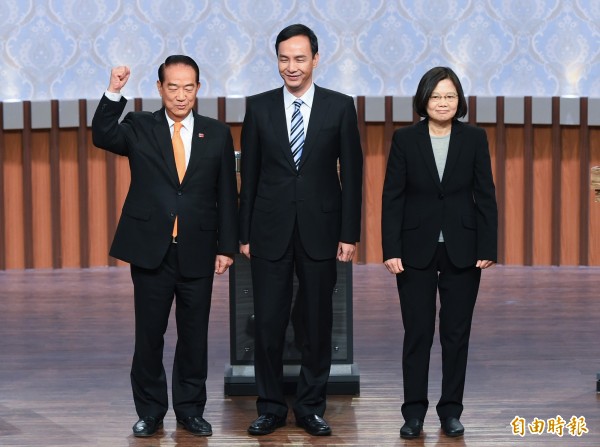 Photo credit: Liberty Times
Photo credit: Liberty Times
Here, I will separate the article into three sections: the first section will provide and overview and analyze individual candidate performance in the three separate rounds. The second section analyzes the role of social media in influencing public responses and reactions. The third section analyzes the apathy of Taiwanese to constant invocations of the 1992 Consensus.
Overview and Analysis of Candidates’ Performance
SOONG MAINLY concerned himself with the domestic and international problems of Taiwan, such as economic problems, food safety, inequality, and cross-straits problem. He provided a clear statement on what reforms and measures that would be taken, as well as numbers, which would ring with the public heuristically as concrete measures. However, there was no mention on how the numbers were reached, and how his policy would attain what he claimed he would. The strategy adopted by Soong in this debate is to capitalize on how both the DPP and KMT have failed to improve Taiwan despite being in power, and to appear to be the “salvation” to Taiwan by leaving Tsai and Chu to their own duel.
Yet, as aforementioned, it may be that there is no room for Soong to enjoy equal attention and treatment as Chu and Tsai, hence, the most effective way in increasing his appeal is simply to focus on what he has to offer even though the public will not actually buy it. It seems counterintuitive, but at this point in the election, Soong has bought himself enough air time to exonerate his past misdeeds as a Mainlander who condemned Taiwanese in the public eye.
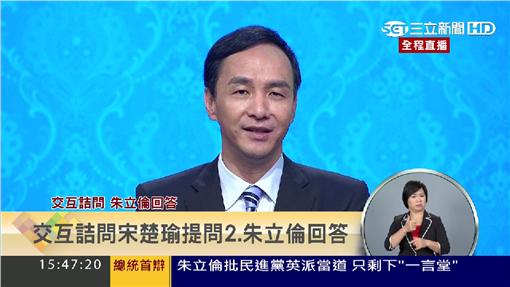 Photo credit: SET
Photo credit: SET
Chu started off with a rather delicate approach, by showing how he is apologetic for what the current administration has failed to achieve. Yet, he failed to argue convincingly to the public that he would be any different from the Ma administration since he spent the rest of the debate criticizing Tsai on her vague policies instead of stressing how he would be different from her. Furthermore, Chu’s advocated tax reforms that still seem to many, catering to corporations; Chu also repeatedly stressed how Taiwan should not engage in class wars, once again, blaming the DPP for it instead of reflecting on how legislature just passed a tax reform that abolished a tax on capital gains.
To Chu, the realization that he would not win only means that he has to decrease the margin of his loss. Therefore, it is not surprising that Chu’s speech lacked substance but only criticisms of Tsai. Yet, such a strategy could have been better utilized to Chu’s advantage. Instead, Chu’s poor responses to many questions in not answering questions but attacking Tsai, and inconsistencies in claiming a different minimum wage of 30k from Jennifer Wang’s claim of 40k, led to public scrutiny and derision.
Tsai, now indisputably ahead in polls, presented her policies vaguely while constantly referring to what she had presented at the policy debates two days earlier, and Tsai often engaged in abstract visionary talk for Taiwan. However, it may come to our notice that she performed poorly during the first round of individual presentations and during the second round of answering the questions posed from the media. She spend the first round mostly criticizing the KMT administration, barely talked about what she has outlined or offered to Taiwan, and engaged in fancy rhetoric, talking about unity, hope, and a brighter future.
In the Q&A section, Tsai brisked through questions such as whether Taiwan will import American pork in exchange for a place in TPP, but spoke little to assure of the possible repercussions that will result from such a neoliberal engagement. Yet, at this stage, being passive or aggressive would not actually affect the election outcome. Whatever Tsai said during the debate, though, might be of use against her when she runs for incumbency.
Therefore, a strategy with foresight on Tsai’s part was to approach questions and attacks on opponents conservatively, letting Chu do the talking. As the saying go, silence is golden; oftentimes the more you speak, the more prone you are to blunders. Tsai’s entire campaign theme revolves about two very idealistic concepts: hope and unity. Therefore, her strategy to speak conservatively might very well be staying consistent to her campaign theme, and provide Chu with less opportunities to attack her, since whatever Chu’s attacks on Tsai can focus on is not new to the public.
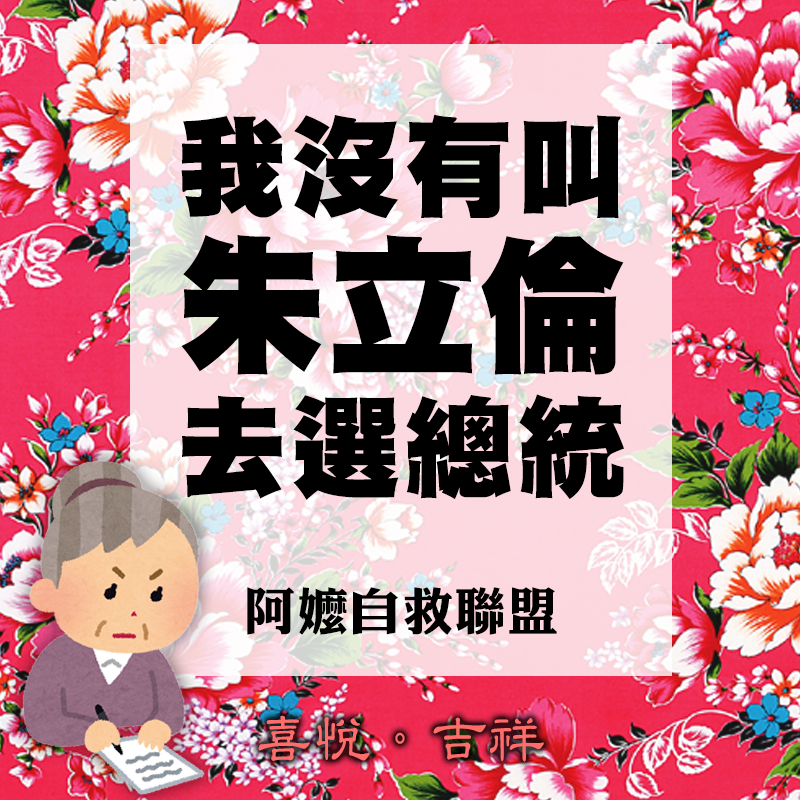 Meme mocking Chu’s “Tamsui Grandma”, stating “I didn’t tell Eric Chu to run foer president”. Photo credit: Taiwan Fugue
Meme mocking Chu’s “Tamsui Grandma”, stating “I didn’t tell Eric Chu to run foer president”. Photo credit: Taiwan Fugue
As observed, the 1992 Consensus seemed to be the basis on which Chu attacked Tsai. Clearly, Chu did not intend to let Tsai off easy. In fact, one may have observed that the various media outlets have prepared themselves to hammer Tsai for her responses on cross-straits ties. Yet, despite having some help from the media, Chu failed to use the 1992 Consensus a tool against Tsai.
Out of the three candidates, it would be that Chu and Tsai seemed to have left Soong out of the conversation, and that Soong, being ostracized, focused on iterating his policies and goals. Although Tsai sometimes maybe did not have the eloquence of Soong and Chu, at least avoiding too much criticism minimized her chances of backlash. Chu on the other hand, made a foolish attempt to appeal emotionally to voters in referring to a “Tamsui grandma” that urged him to run for office—which resulted in one of the most popular memes in this 2016 presidential debate.
Reaction and Responses of the Public: A Social Media War
WHAT CAME OUT of the debate did not surprise many. People expected little out of the debate, partly because the results of the election are very much known. However, it is interesting to note that in this debate, Chu’s strategy of attacking Tsai’s abstract policies seemed to have little effect on his approval rating, given the rather amateur performance he put up with his presentation.
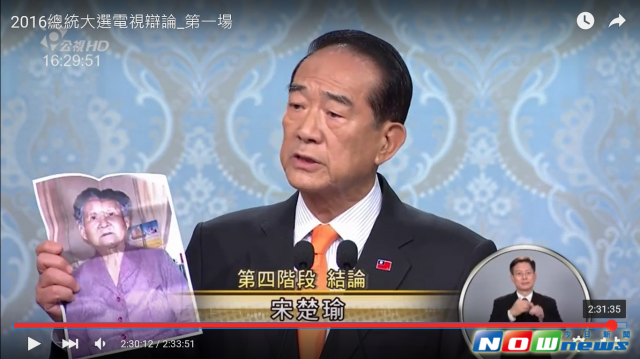
Soong’s teary-eyed performance. Photo credit: NOWnews
If we were to gauge this performance in terms of eloquence and aggression, we might suggest that Tsai actually performed poorest. Yet, the public discourse that followed from the debate wounded up focusing on Chu’s mention of his grandmother during the debate and Soong’s outstanding teary-eyed performance. There was little discussion of the absence of concrete policies in the debate, not to say the least with Tsai’s vague and overly visionary rhetoric as the candidate of the three who will almost certainly be Taiwan’s next president. But the debate did seem to benefit Chu and Soong well with Tsai down by 2%, Soong up by 2%, and Chu remaining at the same approval rate according to a poll by UDN. In another poll by SET, Tsai is received positively by polls, 62.4% to 21.2%, Chu is received negatively by polls, 43.8% to 32.8%, and Soong is received with the highest postivity of 66.3% to 15.9%. Still, regardless of that Chu and Soong are far behind Tsai on approval rate, it will be interesting to see if Tsai will perform better on the second presidential debate.
It may come to our notice that social media, in fact, has a huge role in influencing public discourse and discussion on the debate. If it were not for Chu’s incredibly “punny” and ludicrous attempt at explaining his reason for ditching his mayor position to run for presidency, during which he promised many times that he would complete his tenure, this would not have garnered much attention.
The extent at which social media rules over Taiwanese discourse is large, mainly because of the Taiwanese netizens’ extensive social media use, through LINE and Facebook. Aaron Wyzte recently discussed in an article for New Bloom regarding the phenomena of the rise of Facebook fan pages targeting at attacking Ma and the KMT through Taiwanese “KUSO” memes which are widely circulated, easily understood, and usually quite sarcastic in nature.
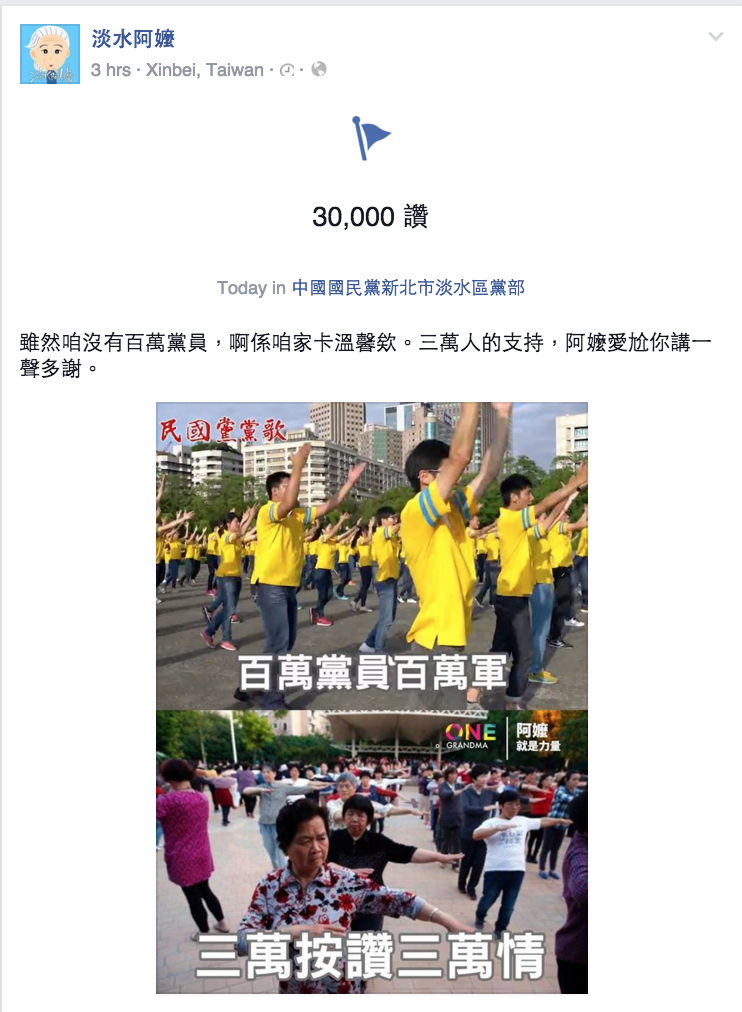 The “Tamsui Grandma” fanpage’s announcement it had reached 30,000 likes
The “Tamsui Grandma” fanpage’s announcement it had reached 30,000 likes
In the case of Chu, anti-KMT pages were quick to attack Chu speech due to its’ “pun-ability”, allowing for the pictures and videos to be widely circulated and hence, eventually drawing the attention of mainstream media. This video offers several examples. The success of this social media war can be seen as a “Tamsui Grandma” Fanpage created to mock Chu received close to 30,000 likes two days after it was created. Soong and Chu on the other hand were not able to capitalize on social media media in order to attack Tsai. Yet, as polls seem to demonstrate, it can also be argued that if it weren’t for the social media war, Tsai’s performance would have been seen as worse, and public scrutiny and attack on her considerably vague responses would have taken up a larger portion of public discourse.
Reaction and Responses of the Public: Domestic issues please! Not the 1992 Consensus
LESS THAN 20 days to the election, campaigning is now at its peak, both online and offline. It will be interesting to see how the social media war between political supporters, or maybe, “trolls” will continue. This is indeed a unique evolution of Taiwan’s electoral campaigning, where the fine line between positive and negative campaigning is blurred through the use of sarcastic puns and memes. However, there are possibly other elements which may have resulted in the failure of the KMT to sway public discourse.
It seem to be that Chu has ran out of topics to hammer Tsai on, except in regards to her ambiguous cross-strait stance—which still isn’t lethal enough to hurt her electoral prospects. The emphasis on the 1992 Consensus failed to gain traction and attention for several reasons. First, Tsai has the experience of being onboard the Mainland Affairs Coucil (MAC), and she managed to conclude several terms and agreements with China. Thus, whether or not she believes in the 1992 Consensus, Tsai’s bases are still very much covered by her previous achievements in enabling trade between Taiwan and China. Second, whether the 1992 Consensus matters or not is not of concern because the problem does not lie intrinsically with forming cross-strait relations, but the fact that only a certain group of people are representing Taiwan without Taiwanese consent at the negotiating table.
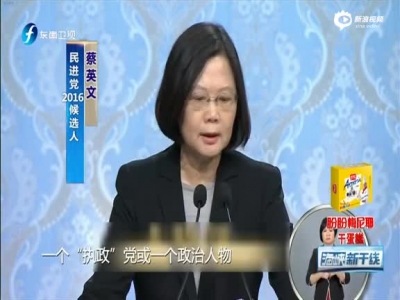 Photo credit: Sina
Photo credit: Sina
Third, Taiwanese are now more cognizant than ever of the KMT using the 1992 Consensus as a tool to threaten Taiwanese, and it might be that recent attempts to leverage on the 1992 Consensus have failed because of the differing jargons in circulation by KMT members themselves. From Hung’s definition of a One China Principle, to Chu’s definition of it, and then to the “One China Principle” that Ma spoke of at the Ma-Xi meeting, how can the KMT convince the Taiwanese to believe in this abstract rhetoric of the 1992 consensus, when their very own definition of it is very much unsettled? Lastly, this campaign has been focused on domestic problems, such as equality, food safety, transitional justice, and crony capitalism. The 1992 consensus is not of priority for the majority of the Taiwanese, as can be seen in the downplaying of identity politics and the rise of third party forces aiming to improve domestic aspects of lives. Domestic issues may, in fact, be taking precedent over international issues in this election.
Hence, although Tsai did not put up with an eloquent or dramatic performance in her debate performance, she did avoid associating herself with the usage of empty statistics and rather, engaged with visionary appeals to the public. Who knows? Perhaps this may be what is most desired by the Taiwanese people. If pragmatic numbers have failed miserably in this past 8 years, maybe more visionary and hopeful rhetoric is most appealing to voters in the present. Chu, on the other hand, could have made better use of his time to probe the DPP for their failure to improve domestic issues, question the DPP on their ambiguous policies, and reflect on what the previous administration could have done better. Instead, he allocated a good amount of his time to attacking Tsai based on the 1992 Consensus, which really is futile at this point.
Concluding Remarks
THE FIRST ROUND of the presidential debate is considerably lacking of concrete content and convincing statements to assure the general public of what any potential president would commit to. In the eyes of the public, a debate is about showing citizens who they will be voting for, not about proclaiming individual political interest. But this past debate was largely empty of content.
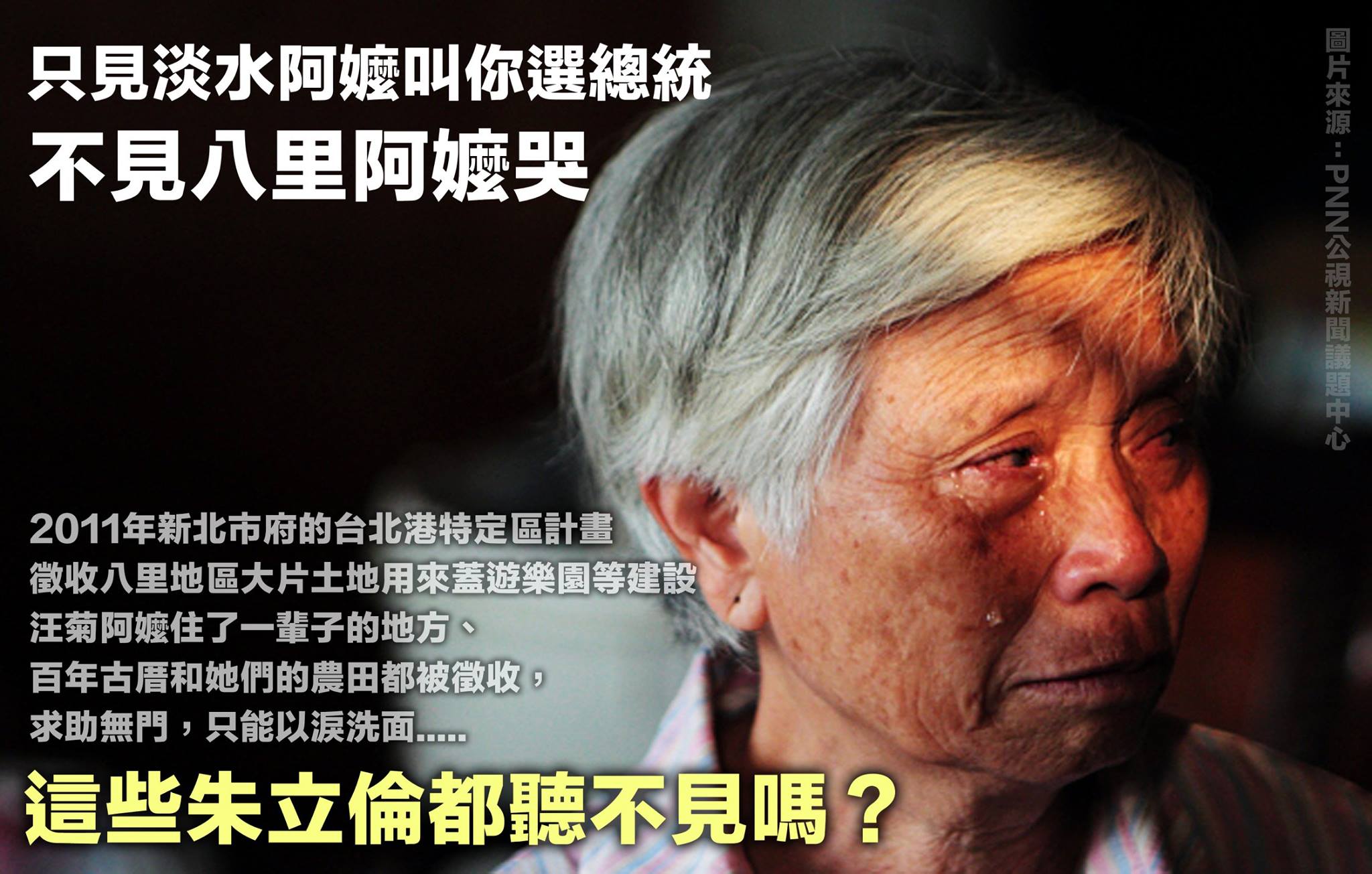 Meme commenting on poor care of the elderly in New Taipei City under Eric Chu’s mayorship. Photo credit: Taiwan Fugue
Meme commenting on poor care of the elderly in New Taipei City under Eric Chu’s mayorship. Photo credit: Taiwan Fugue
Fret not at this rather disappointing debate which concluded with nothing but provided a now popular “grandmother” meme flooding social media. At the very least, this debate has brought much laughter and joy to the Taiwanese public with the flood of memes that came along with it. There will be a second debate held this Saturday January 2, 2016, and hopefully, each candidate will be more prepared and concerned with presenting their policies to the citizens that will be showing up at the voting booths on January 16, 2016—instead of the usual political bickering.


 Photo credit: Liberty Times
Photo credit: Liberty Times Photo credit: SET
Photo credit: SET Meme mocking Chu’s “Tamsui Grandma”, stating “I didn’t tell Eric Chu to run foer president”. Photo credit: Taiwan Fugue
Meme mocking Chu’s “Tamsui Grandma”, stating “I didn’t tell Eric Chu to run foer president”. Photo credit: Taiwan Fugue The “Tamsui Grandma” fanpage’s announcement it had reached 30,000 likes
The “Tamsui Grandma” fanpage’s announcement it had reached 30,000 likes Photo credit: Sina
Photo credit: Sina Meme commenting on poor care of the elderly in New Taipei City under Eric Chu’s mayorship. Photo credit: Taiwan Fugue
Meme commenting on poor care of the elderly in New Taipei City under Eric Chu’s mayorship. Photo credit: Taiwan Fugue